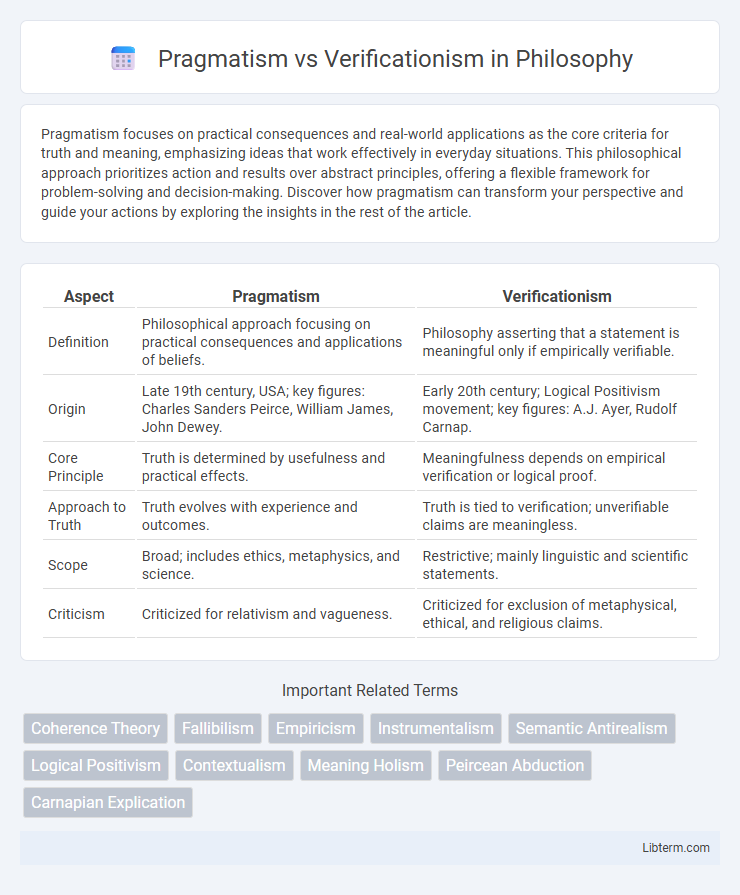Pragmatism focuses on practical consequences and real-world applications as the core criteria for truth and meaning, emphasizing ideas that work effectively in everyday situations. This philosophical approach prioritizes action and results over abstract principles, offering a flexible framework for problem-solving and decision-making. Discover how pragmatism can transform your perspective and guide your actions by exploring the insights in the rest of the article.
Table of Comparison
| Aspect | Pragmatism | Verificationism |
|---|---|---|
| Definition | Philosophical approach focusing on practical consequences and applications of beliefs. | Philosophy asserting that a statement is meaningful only if empirically verifiable. |
| Origin | Late 19th century, USA; key figures: Charles Sanders Peirce, William James, John Dewey. | Early 20th century; Logical Positivism movement; key figures: A.J. Ayer, Rudolf Carnap. |
| Core Principle | Truth is determined by usefulness and practical effects. | Meaningfulness depends on empirical verification or logical proof. |
| Approach to Truth | Truth evolves with experience and outcomes. | Truth is tied to verification; unverifiable claims are meaningless. |
| Scope | Broad; includes ethics, metaphysics, and science. | Restrictive; mainly linguistic and scientific statements. |
| Criticism | Criticized for relativism and vagueness. | Criticized for exclusion of metaphysical, ethical, and religious claims. |
Understanding Pragmatism: An Overview
Pragmatism centers on the practical consequences of beliefs as the core criterion for meaning and truth, emphasizing actions and results over abstract principles. It contrasts with verificationism, which asserts that a statement's meaning is grounded solely in empirical verification or falsification. Understanding pragmatism involves recognizing its foundation in experiential outcomes and utility, making it influential in fields like philosophy, education, and cognitive science.
Defining Verificationism: Core Principles
Verificationism centers on the principle that a statement's meaning is determined by its method of empirical verification, emphasizing observable and measurable evidence as the sole basis for truth. Core tenets include the criterion that only propositions verifiable through sensory experience or logical analysis are cognitively meaningful. This approach rejects metaphysical claims as nonsensical, focusing philosophy on clarifying language and ensuring statements' empirical testability.
Historical Roots and Philosophical Context
Pragmatism, rooted in the late 19th-century writings of Charles Sanders Peirce, William James, and John Dewey, emphasizes the practical consequences and utility of beliefs as central to their meaning and truth. Verificationism, emerging from the Vienna Circle in the early 20th century, particularly from philosophers like Rudolf Carnap and A.J. Ayer, insists that meaningful statements must be verifiable through empirical observation or logical proof. While pragmatism values the functional application of ideas in experience and action, verificationism strictly limits meaningful discourse to propositions that can be definitively tested or logically analyzed within the framework of logical positivism.
Key Thinkers: Pragmatists and Verificationists
Pragmatism, championed by thinkers such as Charles Sanders Peirce and William James, emphasizes the practical consequences of beliefs as the core of their meaning and truth. Verificationism, advanced chiefly by the Logical Positivists like A.J. Ayer and Rudolf Carnap, asserts that a statement's meaning is strictly tied to its empirical verifiability. The contrast lies in pragmatists valuing usefulness and experiential effects, whereas verificationists demand strict observational verification for meaningfulness.
Criteria of Meaning: Pragmatic vs. Verificationist Approaches
Pragmatism defines meaning through practical consequences and the usefulness of ideas in real-world applications, emphasizing the effects of concepts on action and experience. Verificationism, rooted in logical positivism, asserts that a statement's meaning is tied strictly to its empirical verifiability or falsifiability through sensory data. These contrasting criteria prioritize pragmatic utility versus empirical testability as the foundation for meaningful language and knowledge.
The Role of Experience in Knowledge Formation
Pragmatism emphasizes experience as a dynamic and continuous process shaping knowledge through practical outcomes and problem-solving, where truths are validated by their effectiveness in real-world applications. Verificationism, in contrast, asserts that knowledge is meaningful only when statements can be empirically verified through direct sensory experience or logical proof, highlighting a stricter criterium for knowledge validation. The role of experience in pragmatism is instrumental and adaptive, while in verificationism it is foundational and empirical.
Language, Truth, and Meaning: Contrasting Perspectives
Pragmatism posits that the meaning of language is grounded in practical effects and utility, emphasizing truth as what works in practice, while verificationism holds that meaningful statements must be empirically verifiable, linking truth to observable evidence. Language under pragmatism serves as a tool for action and problem-solving, whereas verificationism treats language as a system of propositions subject to strict empirical testing. These contrasting perspectives highlight differing criteria for meaning and truth, shaping how language functions in knowledge acquisition and communication.
Criticisms and Limitations of Pragmatism
Pragmatism faces criticism for its perceived relativism, as it evaluates truth based on practical outcomes rather than objective standards, challenging the notion of absolute truth. Critics argue that pragmatism's reliance on usefulness can lead to subjective interpretations and undermine consistent knowledge validation. Unlike verificationism, which emphasizes empirical verification as a criterion for meaning, pragmatism may lack clear criteria for distinguishing between true and merely expedient beliefs.
Challenges and Objections to Verificationism
Verificationism faces significant challenges regarding its criterion of meaning, as many meaningful statements, including ethical claims and metaphysical propositions, cannot be empirically verified. Critics argue that verificationism itself is self-refuting because its core principle is not empirically verifiable, undermining its authoritative stance on meaningfulness. Furthermore, the demand for strict empirical verification excludes substantial scientific theories and abstract concepts, limiting the scope of meaningful discourse.
Contemporary Relevance: Pragmatism and Verificationism Today
Pragmatism remains influential in contemporary philosophy and cognitive science by emphasizing practical consequences and experiential learning in knowledge formation. Verificationism, though largely critiqued, continues to inform debates in analytic philosophy, particularly regarding the criteria for meaningful statements through empirical verification. Both frameworks contribute to modern discussions on epistemology, scientific methodology, and the philosophy of language by shaping approaches to truth and validation processes.
Pragmatism Infographic

 libterm.com
libterm.com